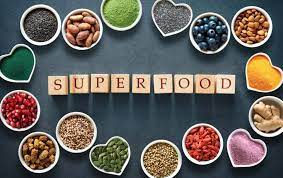Superfoods: Everything You Need to Know and How They Affect Human Health
Superfoods is a phrase that has gained enormous popularity in recent years in relation to food. The majority of people often see this phrase online or on sizable billboards, but few are fully aware of what it means or all that it has to offer. The moment has come to alter the story, however.
Many of us often overlook the reality that these superfoods have long been an essential component of the typical human diet. In one way or another, we have been ingesting these superfoods, but over time, medical professionals have begun to advise just slightly more frequent consumption of these foods.
How Do Superfoods Work?
Superfoods are foods that are nutrient-dense and high in vitamins, minerals, and antioxidants that are beneficial to one’s health, according to Ms. Rutu Dhodapkar of the dietetics team at P D Hinduja Hospital and Medical Research Center in Khar. Superfoods are substances that are very dense in nutrients. This indicates that they provide a lot of nutrients and relatively little calories. They have a lot of nutrients, vitamins, and antioxidants in them.
Millets are great for the intestines since they are gluten-free, according to Ms. Ritika Samaddar, Regional Head – South Zone, Dietetics, Nutrition and Dietetics, Max Super Speciality Hospital, Saket. Millet is healthy for diabetes and the heart since it is high in protein, fiber, and other minerals like calcium and iron. Small superfoods like seeds are rich sources of all the elements. Commonly ingested seeds, such as pumpkin seeds, sunflower seeds, melon seeds, flaxseeds, chia seeds, and sesame seeds, are rich in heart-healthy fat, high-quality protein, and are a fantastic source of vitamins and minerals.
Additionally, one of the most nutrient-dense superfoods is a nut like an almond. Almonds provide a significant nutritious punch since they are packed with protein, fiber, vitamins, and minerals. Almonds provide several health benefits, she said, including those for the heart, weight management, diabetes, and gastrointestinal health.
It is important to keep in mind that native foods that are readily accessible in your area are potent superfoods that may be used in place of pricey and difficult-to-find foreign superfoods. Additionally, the Indian palette and taste preferences may not be compatible with many exotic superfoods. “A few examples are the moringa leaves, which are the local drumstick leaves we rarely take,” says Ms. Ritika Samaddar. These may be consumed as a saag or dried and consumed as a powder, and they are easily accessible. Iron-rich and high in fiber. In a same vein, we have locally grown berries like jamun and shahatoot (mulberry), which are comparable to goji berries and blueberries but considerably less expensive and accessible.
Superfood Benefits
Due to its high concentration of poly and mono unsaturated fats, which are regarded as “good fats,” avocados are known to be effective in lowering the risk of heart disease.
According to Ms. Rutu Dhodapkar, “Cruciferous vegetables indicate health advantages, such as decreasing cancer risk and avoiding heart attacks and stroke.For instance, cabbage, cauliflower, bok choy, broccoli, and Brussels sprouts. They are rich in fiber and provide a sensation of fullness, making them suitable for weight loss programs.
Eicosapentaenoic acid (EPA) and docosahexaenoic acid (DHA), which are found in seafood, are utilised more effectively than alpha-linolenic acid (ALA), which is found in plant sources like flaxseed and almonds. Your risk of heart attack and stroke may be decreased, and omega-3 fatty acids can aid with depression.
Leeks, chives, onions, and other allium crops provide various health advantages due to their antibacterial and antiviral qualities. Vegetables from the allium family can prevent cancer, and garlic in particular may be advantageous for those who have diabetes, high cholesterol, or high blood pressure.
As Ms. Ritika Samaddar points out, “Some superfoods that are rich in fiber, such kale, millets, seeds, and nuts, may aid in weight reduction. The consumption of processed and unhealthy meals must be reduced in order to get the full advantages of superfoods.
“One requires a mix of a healthy balanced diet that is rich in fiber with protein and low in carbohydrates, particularly refined and processed carbs, for weight reduction, especially in terms of fat loss. But an active lifestyle that includes regular exercise, ways to manage stress, and enough sleep all play a crucial role in addition to a healthy diet, she said.
In traditional Chinese medicine, mushrooms are still utilized as a superfood to purify the body and lengthen life. These products have antibacterial, antioxidant, and anti-inflammatory qualities.
Nuts have amazing abilities. Brazil nuts for cancer, cashews for brain function, and almonds for heart health are all excellent sources of fat, fiber, and protein.
Hemp, chia, and flax seeds are just a few of the many nutritious seeds that you may easily include to your diet.
“Red grape skins contain resveratrol, the polyphenol that gave wine its renown reputation as “heart healthy”. Reducing hot flashes and mood swings related to menopause, treating Alzheimer’s disease, enhancing blood glucose management, and maintaining “heart health” are all benefits of resveratrol. In addition to flavonoids, grapes also contain quercetin, a natural anti-inflammatory that has been shown in animal tests to lower the risk of atherosclerosis and defend against the harm caused by LDL cholesterol. According to Ms. Rutu Dhodapkar, quercetin may potentially have cancer-fighting properties.







